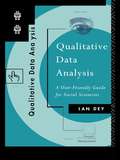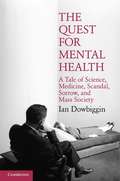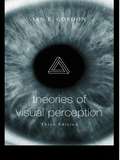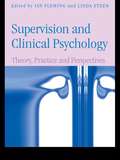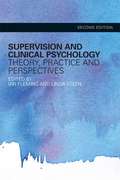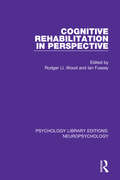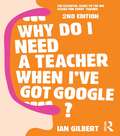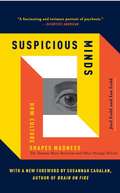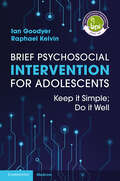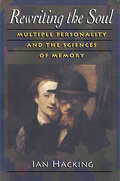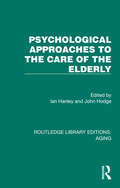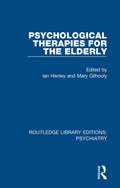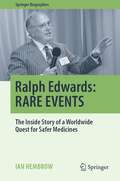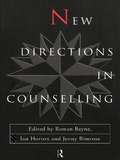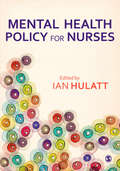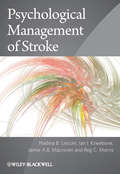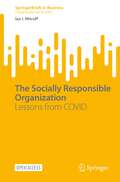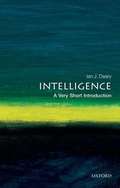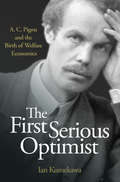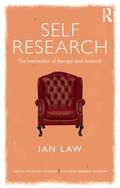- Table View
- List View
Qualitative Data Analysis: A User Friendly Guide for Social Scientists
by Ian DeyFirst Published in 2004. Routledge is an imprint of Taylor & Francis, an informa company.
Environmental and Architectural Psychology: The Basics (The Basics)
by Ian DonaldEnvironmental and Architectural Psychology: The Basics is a jargon-free and accessible introduction to the relationship between people and their natural and built environment. Exploring everything from the effectiveness of open plan offices to how people respond to life-threatening disasters, the book addresses issues around sustainability, climate change, and behaviour, and is grounded in theory and ideas drawn from psychology, geography, and architecture. Author Ian Donald introduces both the theoretical underpinnings and the applications of environment-behaviour research to solving real world problems, encouraging readers to reflect on the role of design and policy in shaping the environments in which they live and work. With chapters considering the impact of environment on identity, wellbeing, crime, and spatial behaviour, Donald shows us not only how people shape and affect the environment, but also in turn how the environment shapes and affects people’s thoughts, feelings, and behaviours. Addressing some of the most important questions of our time, including how behaviour drives climate change, and what we can do about it, this is the ideal book for anyone interested in the interactions between architecture, the environment, and psychology.
The Quest for Mental Health
by Ian DowbigginThis is the story of one of the most far-reaching human endeavors in history: the quest for mental well-being. From its origins in the eighteenth century to its wide scope in the early twenty-first, this search for emotional health and welfare has cost billions. In the name of mental health, millions around the world have been tranquilized, institutionalized, psycho-analyzed, sterilized, lobotomized and even euthanized. Yet at the dawn of the new millennium, reported rates of depression and anxiety are unprecedentedly high. Drawing on years of field research, Ian Dowbiggin argues that if the quest for emotional well-being has reached a crisis point in the twenty-first century, it is because mass society is enveloped by cultures of therapism and consumerism, which increasingly advocate bureaucratic and managerial approaches to health and welfare.
Theories of Visual Perception
by Ian E. GordonTheories of Visual Perception 3rd Edition provides clear critical accounts of several of the major approaches to the challenge of explaining how we see the world. It explains why approaches to theories of visual perception differ so widely and places each theory into its historical and philosophical context. Coverage ranges from early theories by such influential writers as Helmholtz and the Gestalt School, to more recent work in the field of Artificial Intelligence. This fully revised and expanded edition contains new material on the Minimum Principle in perception, neural networks, and cognitive brain imaging.
Showing Time: In Memory of Alberto Argenton
by Ian F. Verstegen Laura Messina-Argenton Tiziano Agostini Tamara PrestHow does a visual artist manage to narrate a story, which has a sequential and therefore temporal progression, using a static medium consisting solely of spatial sign elements and, what is more, in a single image? This is the question on which this work is based, posed by its designer, Alberto Argenton, to whose memory it is dedicated. The first explanation usually given by scholars in the field is that the artist solves the problem by depicting the same character in a number of scenes, thus giving indirect evidence of events taking place at different times. This book shows that artists, in addition to the repetition of characters, devise other spatial perceptual-representational strategies for organising the episodes that constitute a story and, therefore, showing time. Resorting to the psychology of art of a Gestalt matrix, the book offers ha formattato: Italiano (Italia) Codice campo modificato ha formattato: Italiano (Italia) ha formattato: Italiano (Italia) researchers, graduates, advanced undergraduates, and professionals a description of a large continuous pictorial narrative repertoire (1000 works) and an in-depth analysis of the perceptual-representational strategies employed by artists from the 6th to the 17th century in a group of 100 works narrating the story of Adam and Eve.
Supervision and Clinical Psychology: Theory, Practice and Perspectives
by Ian Fleming Linda SteenIncreased attention is now being paid to the role of supervision in both pre-qualification and post-qualification practice in clinical psychology in the UK. This definitive text addresses the issues of central concern to supervisors in clinical psychology. Senior trainers and clinicians draw on relevant research and their own experience, covering:* historical development of supervision and a review of worldwide literature on supervision* supervisory and therapy models* maximizing supervisory resources* supervisory training and effectiveness* cultural and gender issues in supervision* measuring the effectiveness of supervision* future perspectives for supervision in clinical psychology. Supervision and Clinical Psychology provides practical advice essential for clinical psychology supervisors, as well as those in psychiatry, social work and psychotherapy.
Supervision and Clinical Psychology: Theory, Practice and Perspectives
by Ian Fleming and Linda SteenWhat are the developments influencing supervision in clinical psychology? Supervision is crucial to good professional practice and an essential part of training and continuing professional development. This second edition of Supervision and Clinical Psychology has been fully updated to include the recent developments in research, policy and the practice of supervision. With contributions from senior trainers and clinicians who draw on both relevant research and their own experience, this book is rooted in current best practice and provides a clear exposition of the main issues important to supervision. New areas of discussion include: the impact of the recent NHS policy developments in supervisor training practical aspects of supervision a consideration of future trends. Supervision and Clinical Psychology, Second Edition is essential reading for clinical psychology supervisors as well as being invaluable to those who work in psychiatry, psychotherapy and social work.
Cognitive Rehabilitation in Perspective (Psychology Library Editions: Neuropsychology #12)
by Rodger Ll. Wood Ian FusseyOriginally published in 1990, this book constitutes an objective evaluation of different cognitive rehabilitation techniques in relation to different types of brain injury at different stages of recovery. Various forms of cognitive rehabilitation are reviewed and clinical techniques are evaluated on the basis of their ability to restore functional independence or produce behaviour change, and improve aspects of cognitive ability.
Why Do I Need a Teacher When I've got Google?: The essential guide to the big issues for every teacher
by Ian GilbertWhy do I need a teacher when I’ve got Google? is just one of the challenging, controversial and thought-provoking questions Ian Gilbert poses in this urgent and invigorating book. Questioning the unquestionable, this fully updated new edition will make you re-consider everything you thought you knew about teaching and learning, such as: • Are you simply preparing the next generation of unemployed accountants? • What do you do for the ‘sweetcorn kids’ who come out of the education system in pretty much the same state as when they went in? • What’s the real point of school? • Exams – So whose bright idea was that? • Why ‘EQ’ is fast becoming the new ‘IQ’. • What will your school policy be on brain-enhancing technologies? • Which is the odd one out between a hamster and a caravan? With his customary combination of hard-hitting truths, practical classroom ideas and irreverent sense of humour, Ian Gilbert takes the reader on a breathless rollercoaster ride through burning issues of the twenty-first century, considering everything from the threats facing the world and the challenge of the BRIC economies to the link between eugenics and the 11+. As wide-ranging and exhaustively-researched as it is entertaining and accessible, this book is designed to challenge teachers and inform them – as well as encourage them – as they strive to design a twenty-first century learning experience that really does bring the best out of all young people. After all, the future of the world may just depend on it
Suspicious Minds
by Joel Gold Ian GoldWhat if you woke up with the alarming suspicion that you were being watched?One day in 2003, a patient unlike any other that Dr. Joel Gold had seen before was admitted to his unit at Bellevue Hospital. This man claimed he was being filmed constantly and that his life was being broadcast around the world like The Truman Show--the 1998 film depicting a man who is unknowingly living out his life as the star of a popular soap opera. Over the next few years, Dr. Gold saw a number of patients suffering from what he and his brother, Dr. Ian Gold, began calling the "Truman Show delusion," launching them on a quest to understand the nature of this particular phenomenon, of delusions more generally, and of madness itself. The current view of delusions is that they are the result of biology gone awry, of neurons in the brain misfiring. In contrast, the Golds argue that delusions are the result of the interaction between the brain and the social world. By exploring the major categories of delusion through fascinating case studies and marshaling the latest research in schizophrenia, the brothers reveal the role of culture and the social world in the development of psychosis--delusions in particular. Suspicious Minds presents a groundbreaking new vision of just how dramatically our surroundings can influence our brains.
Suspicious Minds: How Culture Shapes Madness
by Joel Gold Ian GoldCombining extraordinary true stories with the latest research, Joel and Ian Gold take us on a wild journey through the delusional brain to explore the intersection of neuroscience, biology, and culture.<P> Mr. A. was admitted to Dr. Joel Gold’s inpatient unit at Bellevue Hospital in 2002. He was, he said, being filmed constantly, and his life was being broadcast around the world “like The Truman Show”—the 1998 film depicting a man who is unknowingly living out his life as the star of a popular soap opera. Over the next few years, Gold saw a number of patients suffering from what he and his brother, Dr. Ian Gold, began calling the “Truman Show Delusion,” launching them on a quest to understand the nature of this particular phenomenon, of delusions more generally, and the nature of madness itself.<P> The current view of delusions is that they are the result of biology gone awry, of neurons in the brain misfiring. In contrast, the Golds argue, delusions are in fact the result of the interaction between the brain and the social world. By exploring the major categories of delusion via fascinating case studies and marshaling the latest research in schizophrenia, the brothers reveal the role of culture and the social world in the development of psychosis, notably delusions. The result is a groundbreaking new direction for thinking about the interaction of the brain and the world around us.<P> Sure to appeal to those who admire the work of Oliver Sacks, Steven Pinker, and Antonio Damasio, Suspicious Minds presents a fascinating study about just how dramatically our surroundings can influence our brains.<P>
Brief Psychosocial Intervention for Adolescents: Keep it Simple; Do it Well
by Ian Goodyer Raphael KelvinThe highest incidence for clinical depressions is during adolescence. Furthermore, mental health illnesses that recur over the life-course begin in young people. 70% of all mental health emerge before thirty years of age. Almost all interventions for young people have been first developed for and targeted at adults. Here for the first time is a talking therapy (BPI), that has been developed for, and with, adolescents. After thirty years of clinical experience with mentally ill adolescents and two major randomised controlled trials of treatment, the authors reveal a brief psychosocial intervention that is as effective as CBT for adolescents with depression with and without comorbid anxiety and conduct disorder. BPI can be taught to mental health practitioners in sixteen hours and they can immediately start delivery of care. After a six-month supervision, new BPI practitioners offer an evidence based and NICE approved treatment in their usual clinical practice.
Unilateral Neglect: Clinical And Experimental Studies (Brain, Behaviour and Cognition)
by Ian H. Robertson John C. MarshallUnilateral neglect is a fairly common disorder, usually associated with a stroke, which results in a neglect or lack of attention to one side of space usually, but not exclusively, the left. Theoretically, it is one of the most interesting and important areas in neuropsychology; practically, it is one of the greatest therapeutic problems facing therapists and rehabilitationists. This book covers all aspects of the disorder, from an historical survey of research to date, through the nature and anatomical bases of neglect, and on to review contemporary theories on the subject. The final section covers behavioural and physical remediation. A greater understanding of unilateral neglect will have important implications not just for this particular disorder but for the understanding of brain function as a whole.
Rewriting the Soul: Multiple Personality and the Sciences of Memory
by Ian HackingTwenty-five years ago one could list by name the tiny number of multiple personalities recorded in the history of Western medicine, but today hundreds of people receive treatment for dissociative disorders in every sizable town in North America. Clinicians, backed by a grassroots movement of patients and therapists, find child sexual abuse to be the primary cause of the illness, while critics accuse the "MPD" community of fostering false memories of childhood trauma. Here the distinguished philosopher Ian Hacking uses the MPD epidemic and its links with the contemporary concept of child abuse to scrutinize today's moral and political climate, especially our power struggles about memory and our efforts to cope with psychological injuries. What is it like to suffer from multiple personality? Most diagnosed patients are women: why does gender matter? How does defining an illness affect the behavior of those who suffer from it? And, more generally, how do systems of knowledge about kinds of people interact with the people who are known about? Answering these and similar questions, Hacking explores the development of the modern multiple personality movement. He then turns to a fascinating series of historical vignettes about an earlier wave of multiples, people who were diagnosed as new ways of thinking about memory emerged, particularly in France, toward the end of the nineteenth century. Fervently occupied with the study of hypnotism, hysteria, sleepwalking, and fugue, scientists of this period aimed to take the soul away from the religious sphere. What better way to do this than to make memory a surrogate for the soul and then subject it to empirical investigation? Made possible by these nineteenth-century developments, the current outbreak of dissociative disorders is embedded in new political settings. Rewriting the Soul concludes with a powerful analysis linking historical and contemporary material in a fresh contribution to the archaeology of knowledge. As Foucault once identified a politics that centers on the body and another that classifies and organizes the human population, Hacking has now provided a masterful description of the politics of memory : the scientizing of the soul and the wounds it can receive.
Psychological Approaches to the Care of the Elderly (Routledge Library Editions: Aging)
by John Hodge Ian HanleyOriginally published in 1984, the overall purpose of this book was to provide ideas and suggestions about the usefulness of applied psychology in dealing with some of the problems of the elderly.
Psychological Therapies for the Elderly (Routledge Library Editions: Psychiatry #11)
by Ian Hanley Mary GilhoolyPrior to publication, it had only recently been appreciated that psychology had a great deal to offer in therapeutic terms to a wide range of patients, and was not merely concerned with assessing and identifying problems. This is particularly so with the elderly where physical and mental problems and multiple pathology are compounded, and where psychological aspects of the quality of life are so important. The focus of this book, originally published in 1986, is on therapeutic approaches and the effective implementation of services. While the book is aimed particularly at clinical psychologists, it will also be of great interest to medical, nursing or occupational therapy staff working with elderly people.
Ralph Edwards: The Inside Story of a Worldwide Quest for Safer Medicines (Springer Biographies)
by Ian HembrowMedical treatments designed to help people can also be harmful or fatal. Around 2.5 million people die this way each year. So if any kind of medicine makes someone unwell, they or their doctor should report it. Those reports, from nearly every country in the world, go to the Uppsala Monitoring Centre (UMC) in Sweden. As the Centre’s first director, Professor Ivor Ralph Edwards transformed it from a tiny operation with limited horizons into an internationally acclaimed scientific organization at the heart of the World Health Organization’s Programme for International Drug Monitoring. He was then succeeded by his wife, Dr Marie Lindquist.This is the story of how a new science developed and a passionate and dedicated pursuit of worldwide medicines safety, with an unerring focus on the welfare of patients. The pioneering work of Ralph, Marie and their collaborators on every continent protected the lives of millions of people. It may yet improve the lives of billions more.
New Directions in Counselling
by Ian Horton Rowan Bayne Jenny BimroseNew Directions in Counselling responds to major changes currently affecting counselling. A team of well-known contributors identify the pressures forcing change, taking into account national and European legislation and the drive from within counselling towards greater professionalism and accountability. Part one considers the impact of accredation, National Vocational Qualifications (NVQs), developing Codes of Ethics and evaluating effectiveness. Part two looks at new interventions for common problems, such as smoking, depression, stress and abuse; new settings for counselling, including the workplace and medical practice; and new techniques, such as using narratives. The final part discusses issues in training, raising questions about the place of a feminist perspective and whether there are still myths about counselling which need to be challenged. New Directions in Counselling makes a timely response to questions affecting all counsellors, whether in training or practice.
Mental Health Policy for Nurses
by Ian HulattMental health nursing has been shaped by a variety of policy factors in the past 50 years. In this new textbook, edited by the mental health policy advisor to the Royal College of Nursing, a range of experts in their field introduce the essential elements of policy and legislation to new students and experienced practitioners which will affect them throughout their careers. Clinical examples are drawn on throughout, to help students think about the real-life context of what can be a difficult subject.
Psychological Management of Stroke
by Ian I. Kneebone Jamie A. Macniven Nadina B. Lincoln Reg C. MorrisPsychological Management of Stroke presents a review and synthesis of the current theory and data relating to the assessment, treatment, and psychological aspects of stroke.Provides comprehensive reviews of evidence based practice relating to strokeWritten by clinical psychologists working in stroke servicesCovers a broad range of psychological aspects, including fitness to drive, decision making, prevention of stroke, and involvement of carers and familiesReviews and synthesizes new data across a wide range of areas relevant to stroke and the assessment, treatment, and care of stroke survivors and their familiesRepresents a novel approach to the application of psychological theory and principles in the stroke field
The Psychodynamics of Enlightened Leadership: Coping with Chaos (Management, Change, Strategy and Positive Leadership)
by Ian I. Mitroff Ralph H. KilmannThis open access book provides a comprehensive look at the pluses and minuses of leadership in times of an unparalleled crisis, such as the COVID-19 global pandemic. It examines the COVID-19 crisis in terms of psychodynamics, crisis management, and especially from the standpoint of complex, messy systems. It analyses how leaders need to think and act differently to cope better with—and potentially prevent—future crises.
The Socially Responsible Organization: Lessons from COVID (SpringerBriefs in Business)
by Ian I. MitroffThis book explores the nature of the socially responsible organization, specifically the role of crisis management in creating a socially responsible organization. It applies the Myers-Briggs Personality Typology (MBPTI) and the Thomas-Kilmann Conflict Framework to issues such as responses to the COVID-19 pandemic, regulation of tech companies, and infrastructure. Dr. Mitroff lists the major arguments given in regards to these issues and subjects them to the strongest possible scrutiny and critique to hold both individuals and organizations accountable to the larger responsibilities we share as global citizens. This is an open access book.
Intelligence: A Very Short Introduction
by Ian J. DearyFor people with little or no knowledge of the science of human intelligence, this volume takes readers to a stage where they are able to make judgments for themselves about the key questions of human mental ability. Each chapter addresses a central scientific issue but does so in a way that is lively and completely accessible. Issues discussed include whether there are several different types of intelligence, whether intelligence differences are caused by genes or the environment, the biological basis of intelligence levels, and whether intelligence declines as we grow older.
The First Serious Optimist: A. C. Pigou and the Birth of Welfare Economics
by Ian KumekawaA groundbreaking intellectual biography of one of the twentieth century's most influential economistsThe First Serious Optimist is an intellectual biography of the British economist A. C. Pigou (1877–1959), a founder of welfare economics and one of the twentieth century's most important and original thinkers. Though long overshadowed by his intellectual rival John Maynard Keynes, Pigou was instrumental in focusing economics on the public welfare. And his reputation is experiencing a renaissance today, in part because his idea of "externalities" or spillover costs is the basis of carbon taxes. Drawing from a wealth of archival sources, Ian Kumekawa tells how Pigou reshaped the way the public thinks about the economic role of government and the way economists think about the public good.Setting Pigou's ideas in their personal, political, social, and ethical context, the book follows him as he evolved from a liberal Edwardian bon vivant to a reserved but reform-minded economics professor. With World War I, Pigou entered government service, but soon became disenchanted with the state he encountered. As his ideas were challenged in the interwar period, he found himself increasingly alienated from his profession. But with the rise of the Labour Party following World War II, the elderly Pigou re-embraced a mind-set that inspired a colleague to describe him as "the first serious optimist."The story not just of Pigou but also of twentieth-century economics, The First Serious Optimist explores the biographical and historical origins of some of the most important economic ideas of the past hundred years. It is a timely reminder of the ethical roots of economics and the discipline's long history as an active intermediary between the state and the market.
Self Research: The intersection of therapy and research
by Ian Law‘Self research’ is both a therapeutic and a research endeavour that enables the subject of the research to interpret and validate their own data. In Self Research, Ian Law outlines and draws together the theoretical, institutional and practice elements of this work, and offers illustrative examples of how different elements of the methodology can be applied in practice. He proposes a methodology for the practice of self research that is based on an epistemological approach, thereby closing the interpretative gap between the researcher and the researched. Engaging in therapeutic work with those who experience their sense of self as problematic can be transformative in two key respects: it enables them to produce a sense of self which acknowledges that an understanding of one’s self is discursively produced, and it helps locate that sense of self within its historical, political and social context. By setting out the theoretical underpinnings of the process across a range of different contexts, Law develops a methodology for doing ‘talk therapy’, and researching the self that are one and the same. This methodology allows those who are both the subject and object of their own research to have the authority to determine its meaning, relevance and validity. The book will be essential for advanced students of counselling, along with practicing therapists in psychotherapy across different schools of practice.
